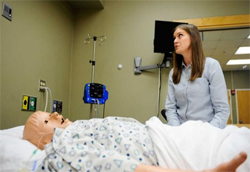Summerville
 The campus was originally used as a Confederate Army arsenal during the Civil War and included a massive powder works to supply gunpowder for the Confederate Army. Following the surrender, the arsenal fell into more of a support role, beginning with the Spanish-American War in that the arsenal produced manufacturing equipment, seacoast targets, and was a repair station. In World War One, the station repaired rifles and small arms, but produced ordnance material and fire control operations for World War Two. In 1955, the arsenal was closed, and two years later the land was given to the local Board of Education, which used it to open the Junior College of Augusta. In 1958, the name changed to Augusta College, and in 2001 to Augusta State University.
The campus was originally used as a Confederate Army arsenal during the Civil War and included a massive powder works to supply gunpowder for the Confederate Army. Following the surrender, the arsenal fell into more of a support role, beginning with the Spanish-American War in that the arsenal produced manufacturing equipment, seacoast targets, and was a repair station. In World War One, the station repaired rifles and small arms, but produced ordnance material and fire control operations for World War Two. In 1955, the arsenal was closed, and two years later the land was given to the local Board of Education, which used it to open the Junior College of Augusta. In 1958, the name changed to Augusta College, and in 2001 to Augusta State University.
Located on Walton Way, the Summerville campus houses many of the undergraduate programs, and the Jaguar Student Activities Center. The Maxwell Performing Arts Theatre, History Walk, Mary S. Byrd gallery of Art, Maxwell Alumni House are all found on this campus. In addition, the James M. Hull College of Business, College of Education, College of Science and Mathematics, and Pamplin School of Arts, Humanities, and Social Sciences are located here.
The campus was formerly well-known for the Arsenal Oak, a tree that contained wood believed to be 250-400 years old, until it was cut down in June of 2004 because of disease.